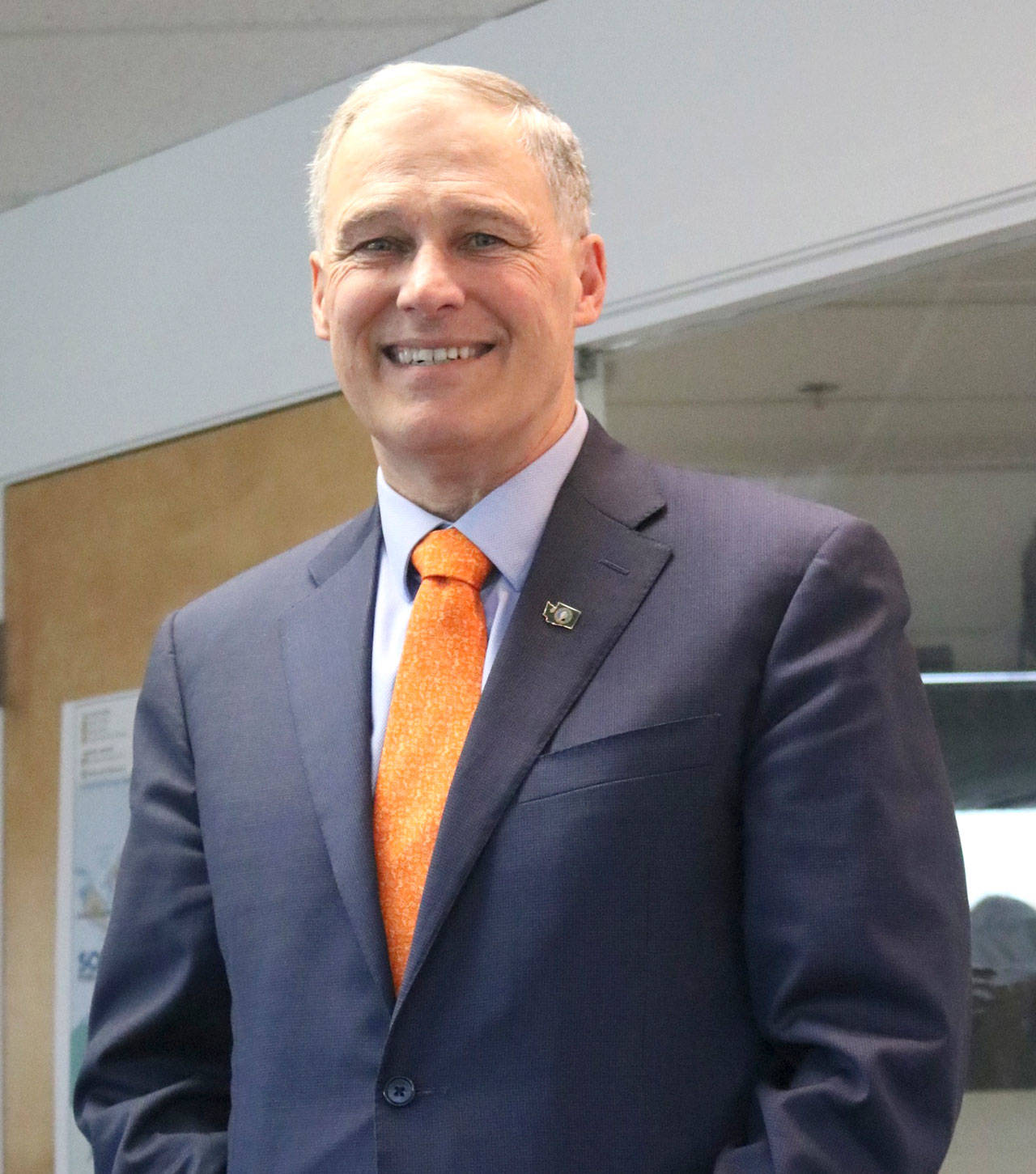Washington state Gov. Jay Inslee’s motto this legislative session is a favorite phrase of the late British Prime Minister Winston Churchill during World War II — “Action this day.”
“We need to act, we need to act now,” Inslee, who has Churchill’s famous words hanging on his office wall, said when discussing climate change.
Green energy is just one of several goals headlining Inslee’s to-do list in the 2018 legislative session which began Jan. 8. During a visit to the Reporter’s office on Jan. 11, Inslee outlined his top priorities for 2018.
Education funding
Education is “the paramount duty of the state,” according to Inslee. He called it a “bipartisan success” that both sides of the aisle came together in the Legislature last year to compromise on a $7 billion solution to fulfill the state’s constitutional mandate to fully fund education, but noted that the state Supreme Court has ordered McCleary funding to go into effect a year early.
Luckily, Inslee said, “we have the cash to do that now in reserves.” He proposes a carbon tax, the funding from which would replenish the state’s reserves for the first year.
Inslee said that he did not think raising the property taxes in wealthier school districts, such as Bellevue and Issaquah, was “the right way,” but commented that “you can thank the Republican party for that.”
Issaquah School District members have criticized McCleary for not fully funding special education, and have argued that special education should be defined as part of a fully funded education system.
Inslee responded that the Supreme Court has declared the funding plan to be constitutional.
“The challenge flag was thrown and the ruling on the field was confirmed,” Inslee said.
However, he noted, just because the decision was made does not mean that there still isn’t work to be done in securing educational funding for Washington students.
“McCleary was not to fix all education for all time,” Inslee stressed.
Green energy
On the second day of the legislative session, Inslee proposed a statewide carbon tax to encourage people — and in particular big business — to use smaller amounts of fossil fuels. Washington, Inslee said, has experienced serious problems, such as the rampant forest fires of the past few years, because of climate change.
Companies such as Puget Sound Energy “see the utility of this [carbon tax] and why it makes sense,” Inslee said, adding that “many companies prefer this.” He explained that the technologies to implement green energy strategies into business have gotten much more accessible and affordable in recent years.
Inslee traveled to Bonn, Germany to observe the way green energy is embraced there, and would like Washington to follow Europe’s example. Green energy jobs are the fastest-growing area of the economy, he said.
He pointed to British Columbia — “the best economy in Canada,” he said — as a successful government that has imposed a carbon tax, as well as many European countries and China.
Both nationally and statewide, there is more bipartisan agreement on the environment, Inslee noted, than on other issues.
“[Republicans] recognize that the public doesn’t buy Donald Trump’s mouthwash that [climate change] is a hoax,” Inslee said.
Protecting net neutrality
For Inslee, the No. 1 way to help small businesses is to protect net neutrality.
“We need to protect the state’s net neutrality because the federal government will not,” Inslee said.
“If we don’t reverse it, small businesses will be at a disadvantage to big behemoths and incumbents from the fast lane,” he continued. “If you get rid of net neutrality, it favors the incumbent … and disadvantages the new kid on the block.”
Fighting the opioid crisis
More Washingtonians die of opioid-related causes than car accidents per year, and Inslee said that he is determined to turn the crisis around.
Carrying out the 2016 Washington State Opioid Response Plan, Inslee wants to focus on better treatment, reducing overuse and over-prescription of opioids in the first place — what he calls a “hub-and-spoke system.”
When it comes to supervised injection sites, currently illegal throughout the U.S. but proposed by the King County Council as a possible way to fight the opioid epidemic, Inslee said that he has not yet formed an opinion but wants to learn more. He is “interested in looking at any evidence of their efficacy,” specifically how they might “reduce the spread of infectious diseases and get people into treatment.”
State vs. federal
As leader of a famously blue state, Inslee is passionate about staying true to his constituents, even if it means directly opposing the policies and laws of the federal administration. From the Muslim travel ban to offshore drilling, from net neutrality to climate change, Inslee firmly and loudly stands in defiance of the Trump administration.
“We stand up for Washington values and we are not intimidated,” Inslee said. “We can control our own destiny.”


